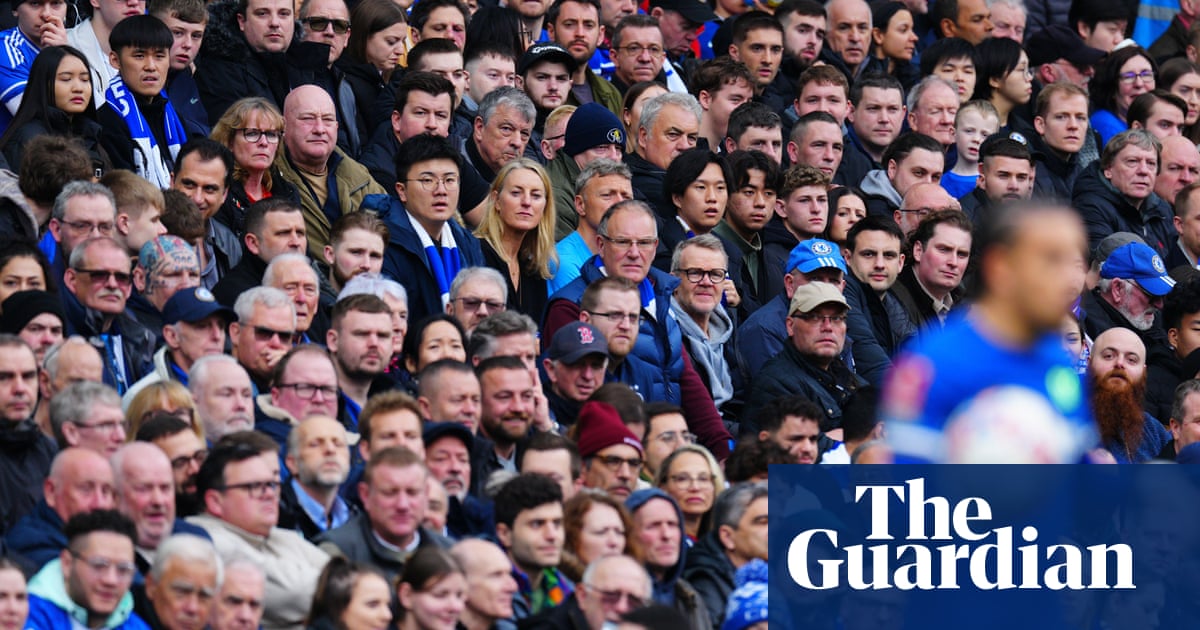
It was hard not to admire the timing when Chelsea sent a survey about the match day experience at Stamford Bridge to their supporters this week. The first point to ponder? “Chelsea FC is a well-run club.” Later on? “I feel positive towards Chelsea FC at the moment” and “I have a positive experience when attending matches at Stamford Bridge”.
How to respond? Expect a range of views when the Chelsea Supporters’ Trust holds a special general meeting after Saturday’s home game against Burnley. Chris Isitt, the chairman of the Chelsea Pitch Owners, is the special guest, while there will be a Q&A session once the CST has updated members on “recent activity”.
That could take a while. A lot has happened since Chelsea, who are expected to announce rises in season ticket prices soon, hosted Leicester in a mutinous atmosphere before the international break. The dust was settling on a chaotic FA Cup quarter-final win when the CST went public with a letter to Todd Boehly and Behdad Eghbali that warned the club’s co-controlling owners of a slide towards “irreversible toxicity” in the stands. It was said concerns over higher ticket prices, the cost of merchandise and travel to games, and a lack of communication from the board could lead to organised protest.
This runs deeper than dissatisfaction with performances. The glory of the Roman Abramovich era has faded and Chelsea, who are 11th in the Premier League despite spending over £1bn on signings, are struggling under the ownership of Boehly and Clearlake Capital. Supporters worry that the owners do not know what they are doing. They worry about the silence over the redevelopment of Stamford Bridge, particularly as rival clubs play in bigger, modernised grounds. Members complain on social media about tickets being inaccessible. Many people talk of a disconnection with the club.
It would be glib to dismiss it all as whingeing from a fanbase spoilt by the success under Abramovich. The discontent will simmer down if Chelsea have a strong end to the season and win the FA Cup, but it will still exist, emerging as soon as an inconsistent team goes through another dip.
The club cannot be complacent. The CST, who described Chelsea as “a laughing stock on and off the pitch”, reflects its members’ concerns. Adopting a punchy stance, the Trust published a response to its letter from the club’s chief executive officer, Chris Jurasek, and then criticised it through the organisation’s chairman, Mark Meehan.
Battle lines were drawn. Jurasek, who declined an interview request this week, is portrayed as the villain of the piece. However, the fan advisory board, a body that works closely with the club, delivered an apparent rebuke to the CST last Monday by stating that it does not “recognise the suggestion that fans are not being involved in the future of the club” and calling on fans not to “seek chaos and division through attacks and campaigns”.
The CST has not responded but suspicion has grown on all sides. Jurasek has been accused of referring to fans as “customers” and his relationship with the CST needs to be repaired. There is a feeling that the American is out of touch with fan culture. Jurasek was criticised for cutting bus subsidies for away travel last August. “A lot of vulnerable people use the coaches and it parks outside the away end,” Tim Rolls, a writer for the cfcuk fanzine, says. “It’s a drop in the ocean in terms of income. It seemed petty.”
A bus user says that people are finding cheaper, alternative means of travel. There was a community on the coaches. It suited older away fans. Rolls, who is 66 and the beneficiary of a half-price season ticket, says a talking point is that this ownership does not care for “legacy fans”.
“People my age think they would happily jettison us,” Rolls says, voicing fears that Chelsea want to attract younger, richer, one-off attenders who will spend more on tickets and merchandise at games. Is Stamford Bridge becoming Americanised? Regulars wonder if “tourists” are diluting the atmosphere. Rolls points to the creation of the dugout club, a section housing wealthy punters behind the home bench.
“It’s £5,000 for the Manchester United game next Thursday,” he says. “It’s ridiculed by supporters. I hang around the fanzine store before the game. It’s mainly old-school people. There’s a lot of discontent. These aren’t people who are going to boo or chant against Boehly but they’re not happy.”
The frustration has boiled over. Raheem Sterling was booed during the win over Leicester. Mauricio Pochettino, the head coach, draws opprobrium. Boehly was targeted with abusive chants during a draw at Brentford. Stickers in some concourse areas at Stamford Bridge have depicted Boehly and Clearlake’s founders, Eghbali and José E Feliciano, as clowns.
Younger fans are said to be the loudest and most rebellious at games. Claims of problems in Clearlake’s relationship with Boehly, who will be replaced as chairman in 2027, make supporters worry that the club is dysfunctional.
Those rumours have been denied strongly. But a financial source believes that Clearlake, a private equity group, is under greater pressure from investors to bring success to Chelsea. News of a pretax loss of £90.1m in the last financial year has raised doubts over Chelsea’s ability to meet profit and sustainability rules. Higher commercial and marketing income would be welcome. It is denied that promises were ever made to explore all revenue streams before targeting supporters. There is bemusement at how quickly fans have turned on Boehly, Pochettino and the players after setbacks.
But patience is limited. Supporters are waiting for an announcement on ticket prices, which were frozen last year. A debate is rumbling away inside the club. This month the message coming out of Chelsea was that a rise would be no higher than 8%, with figures of 5-7% deemed most likely, but the relevant figures are yet to agree on the numbers. Anything above 10% would only intensify Chelsea’s culture war and make fans think hard about whether to renew. The results of the survey will be interesting.












